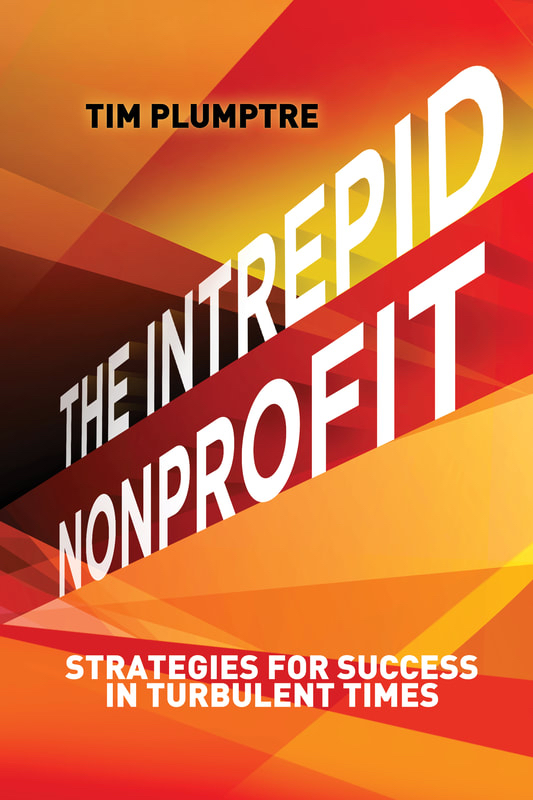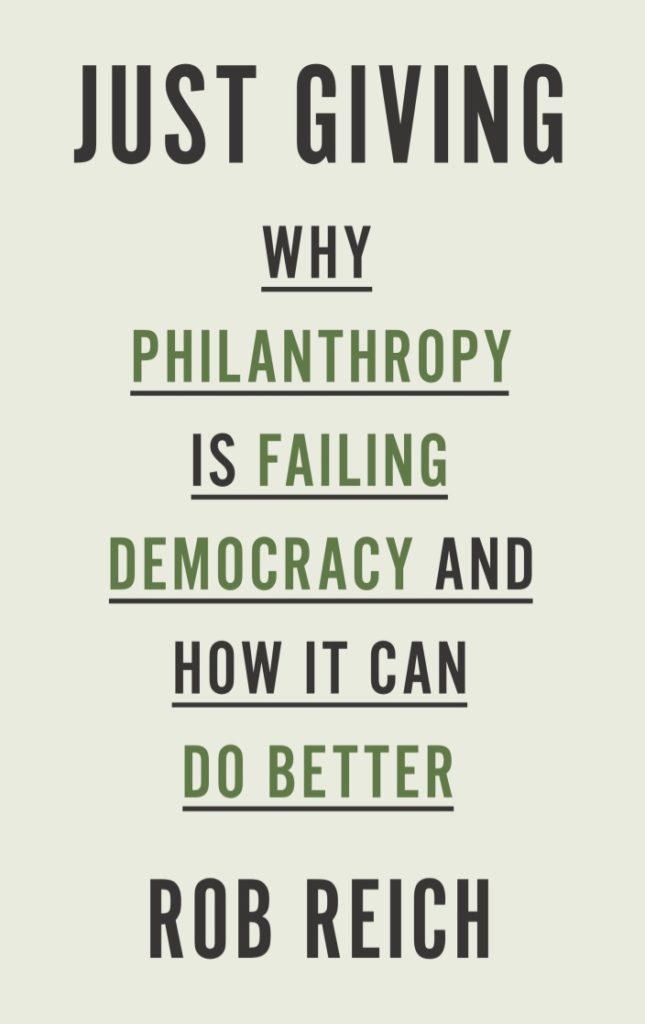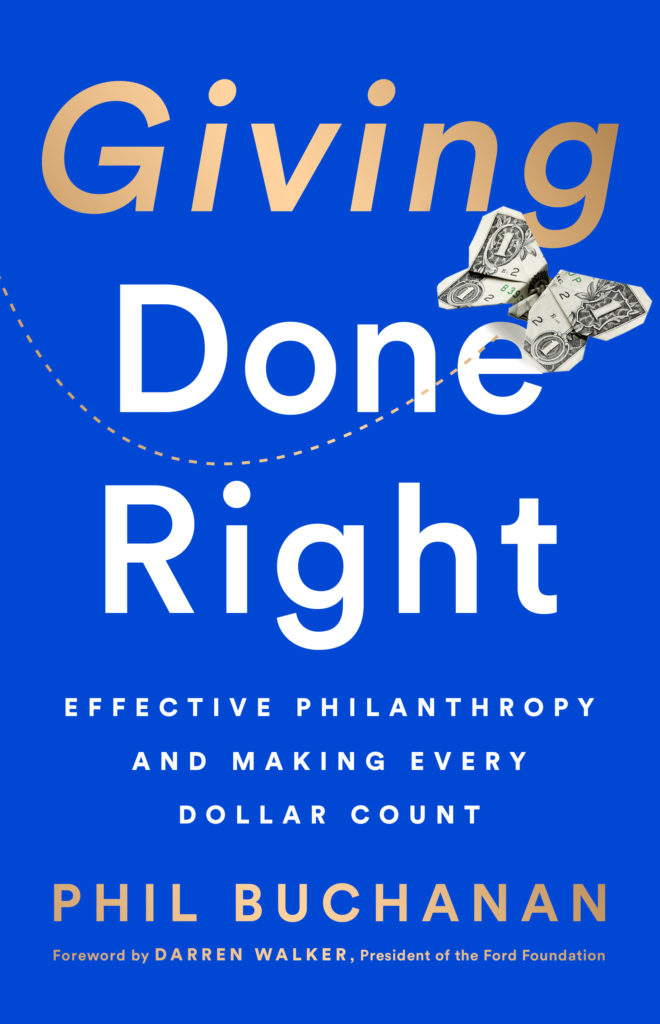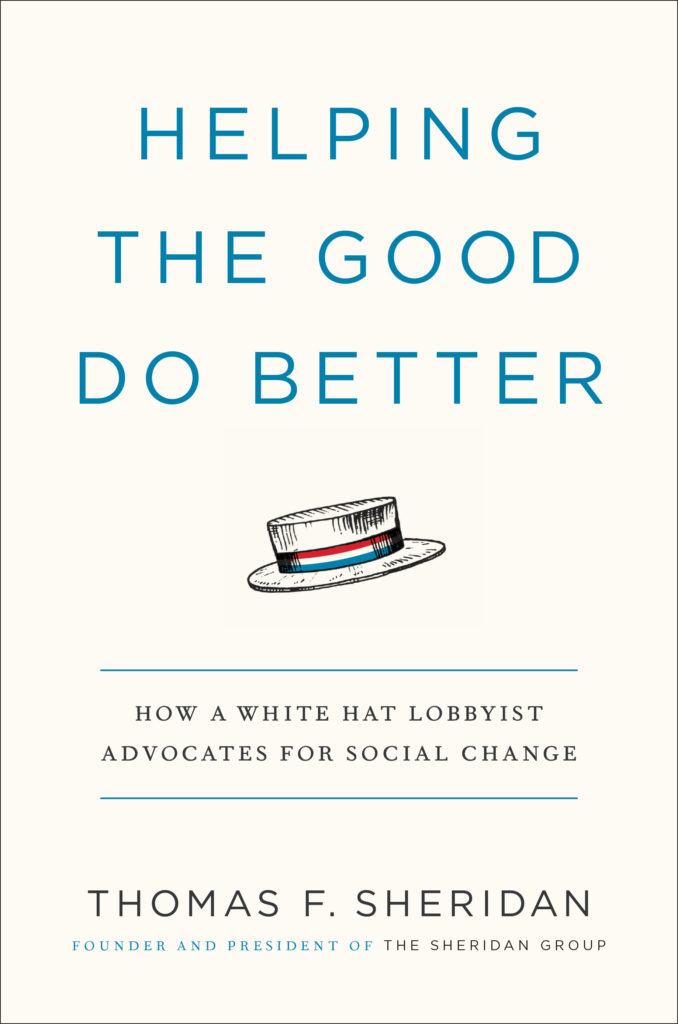- The Intrepid Nonprofit by Tim Plumptre
- Just Giving: Why Philanthropy is Failing Democracy and How It Can Do Better by Rob Reich
- Giving Done Right: Effective Philanthropy and Making Every Dollar Count by Phil Buchanan
- Helping the Good Do Better: A White Hat Lobbyist’s Winning Strategies from the Front Lines of Social Change by Thomas F. Sheridan
What can charities do in the face of change?
by Maryann Kerr, July 4, 2019
The Intrepid Nonprofit, Tim Plumptre, Friesen Press, 307 pp., June 2019, 304 pp., $37.00, $34.12
In The Intrepid Nonprofit, author Tim Plumptre takes us on a journey that encompasses both a 30,000-foot view of the non-profit sector and a granular one. Bringing more than three decades of experience to the task, he has worked as a CEO, a director, board chair, consultant, community volunteer, funder, led two non-profit organizations, and is the founder of the non-profit Institute on Governance, the latter of which has clearly influenced his writing.
His choice of book title speaks to the stance he believes non-profits and their leaders need to take as they face uncertain times—a quick search of synonyms for intrepid includes fearless, unafraid, undaunted, bold, daring, and audacious.
By providing a history of, and context for, the current state of affairs in Canada’s charitable sector, Plumptre paints a convincing and compelling portrait of a sector on the precipice of significant disruption. Based on interviews with more than 50 individuals representing a cross-section of the sector, an extensive literature review, and drawing from his deep expertise within the Canadian charitable sector, he offers a critical analysis of where we’ve been, where we are, where we might be headed and tips for managing the future. Speaking eloquently about the role of Board members, he writes about the origin of many of our current governance issues, and provides specific suggestions, and resources, to improve the effectiveness of non-profit boards.
The Intrepid Nonprofit can be read cover to cover or used as a reference book by skipping to chapters that speak to specific topics, such as governance, finance, fundraising, people, technology, human resources, leadership, strategy, sector legislation, survival strategies, mergers and more. Whether you are new to the sector, at mid-career or a seasoned professional, you will learn something from The Intrepid Nonprofit. Speaking to how he hopes the book will be used, Plumptre writes,
“I hope it will provide perspective. Many leaders are under so much pressure that they have little time to lift their heads to examine the larger context within which their organization is functioning. This book examines important features of the contemporary non-profit landscape and the challenges it poses. It suggests various strategies that may be helpful in confronting those challenges, including ideas about governance that may be useful both at the level of the individual organizations and at the societal level.”
His overview of the sector, the historical moments that have impacted our direction, his description of the many forces at play in shaping it, coupled with the number of practical tips and suggestions throughout the book, make this a necessary tool for every charity.
Wondering how to apply risk management protocols to your organization? Check.
Considering a merger and not sure where to begin? Check.
Struggling with how best to collaborate or network effectively with other like-minded organizations? Check.
Trying to figure out how best to support or evaluate your board? Check.

Trying to determine if Imagine Canada’s Trustmark accreditation program is right for you? Check.
The systems analysis provided throughout the book is intelligent and thoughtful. The fact that the author neither simplifies nor complicates the reality of the sector’s challenges and opportunities is refreshing.
In The Intrepid Nonprofit, Plumptre does not foresee a doomsday for the charitable sector. In tackling large topics like adaptability and digital technology, as well as the sector’s over emphasis on measurement and accountability, he makes a strong case for the continued and elevated role the civil sector is likely to play in the future. He is optimistic, but points out that business as usual won’t cut it,
“I don’t think non-profits are all about to disappear, but I have no doubt that many will have a very difficult time in the years ahead. Some will, indeed, flounder, no matter how important the work they are doing.”
If every current and potential board member from coast to coast to coast could be given a copy of The Intrepid Nonprofit, there is no doubt that our sector would benefit from the wisdom and perspective gained. As the author points out, he “seeks to shine a light ahead into a future that often appears murky, illuminating issues that many organizations will need to address.”
Maryann Kerr has served local, provincial and national organizations in executive leadership. She is currently the Chief Happiness Officer/CEO and principal consultant with the Medalist Group, a philanthropic firm she founded in 2016.
Considering the political consequences of philanthropy
by Juniper Locilento, MPNL, CFRE, July 4, 2019
Just Giving: Why Philanthropy is Failing Democracy and How It Can Do Better by Rob Reich, Princeton University Press, 256 pp., November 2018, $33.35
Rob Reich’s Just Giving:Why Philanthropy is Failing Democracy and How It Can Do Better explores giving as a social and political practice. A professor of political science, director of the Center for Ethics in Societyand co-director of the Center on Philanthropy and Civil Society, all at Stanford University, Reich sets out to establish a political theory of philanthropy to serve as a framework for exploring its role in liberal democratic society.
Philanthropy professionals, of which I am one, have tended to operate on the premise that all giving is good, and more giving is better.
Reich argues that it “should not be obvious…that philanthropy is always and everywhere a good thing.”
The book’s title is a double entendre, imploring the reader to consider philanthropy from the perspective of nothing less than justice. Just Giving is linked thematically to David Callahan’s The Givers (2017) and Anand Giridharadas’ Winners Take All (2018) as highly critical explorations of modern-day philanthropy and the narrative of philanthropists as heroes. This may be challenging for fundraisers whose professional merit is judged on their ability to get the gift. But Reich contends that philanthropy is not merely about private morality or the expression of personal values: public morality is at stake. Thus, the political consequences of philanthropy—its effect on democratic values and systems—must be considered.
The topic is timely. Canada’s Senate Special Committee on the Charitable Sector recently released Catalyst for Change, a wide-ranging report that could significantly impact the structures that underpin philanthropic activity in this country.
Philanthropy professionals have a responsibility to understand the environment in which we work, and the implications of the philanthropic gifts that we facilitate. Without this holistic perspective, we may find ourselves in conflict with democratic values and part of the problem facing our communities, rather than as part of the solution.
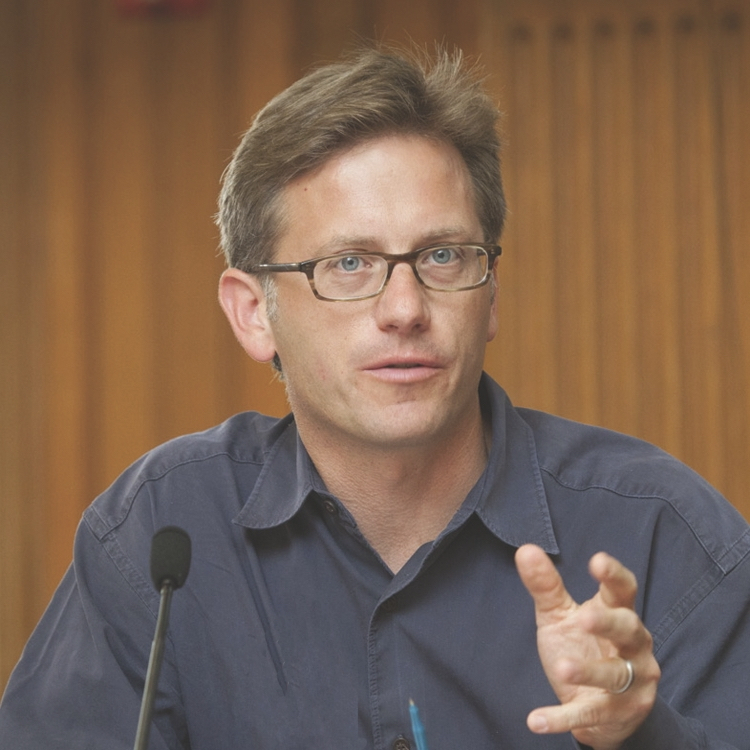
Reich explores philanthropy in relation to the key democratic values of liberty and equality: liberty because philanthropy is voluntary, and equality because “for many people and in many historical traditions, philanthropy has something to do with providing for the poor and disadvantaged.”
The theory is that “philanthropy results in the lessening of inequality between rich and poor, either through direct transfers…or efforts to improve structural conditions… .” Reich explores the tension between these values and, through an examination of U.S tax structures, finds that “policies governing philanthropy appear to be indifferent to equality, and instead valorize and subsidize the exercise of liberty.”
Reich also finds that, again in the U.S context, at most “one-third of charity is directed to the needs of the poor.”
While U.S. philanthropic output is greater than any other country on the planet, it may come at a cost to democracy as wealthy donors weaponize their giving to support causes that align with their political stripes, park their substantial assets in donor-advised funds with no disbursement requirements and even embark on private philanthropic ventures with virtually no requirements for transparency or accountability. Whether in the U.S, Canada or elsewhere, we can’t forget that with every charitable contribution, the government forgoes tax revenue that would have ultimately ended up in public coffers and, at least in theory, deployed for public good.
While he concedes that “private funding of what individuals believe to be in the public interest is legitimate because government is not infallible,” Reich strongly objects to the hallmarks of philanthropic structure, specifically, the current design of most tax-subsidized giving, giving in perpetuity, and rigid respect for donor intent.”
The Vox Media podcast Future Perfect offers compelling contemporary illustrations of the last two in a recent episode entitled Donors from Beyond the Grave.
Ultimately, Reich contends that “perpetual private philanthropic foundations, no matter how enlightened the founder, are scandalous” and, drawing on the works of Anne-Robert Turgot and John Stuart Mill, demonstrates that this is not a new line of thinking. Readers may be surprised to learn of the vociferous criticism once aimed at the likes of Andrew Carnegie and John D. Rockefeller, now mostly celebrated for their philanthropic acts.
Perpetuity. Donor Direction. Tax Credits. These are the sacred cows of philanthropy, but for Reich, nothing is off the table. Rather, he suggests that ordinary giving by individuals [should aim to promote] pluralism and the decentralization of power…and that philanthropic foundations should focus on discovery, specifically “an experimentalist approach to funding and assessing long-time-horizon policy innovations, in order to secure justice across generations.”
Just Giving:Why Philanthropy is Failing Democracy and How It Can Do Better is an important examination of the structures and practices of contemporary philanthropy and their implications for democratic systems. While Reich finds that many of today’s policies do not support democracy, he is ultimately able to posit a redemptive path, concluding that philanthropy and democracy canbe compatible.
Reich’s work presents an important opportunity for those engaged in both policy-making and philanthropy to consider the efficacy of current structures and their implications. Do we believe that philanthropy should be about exercising personal liberties, or should it focus on bringing about equality? Should it be deployed to maintain the status quo, or to change it? Reich’s political theory of philanthropy offers a framework for such questions, in the context of protecting, and perhaps even strengthening, democracy.
Ultimately,Just Giving serves as an invitation to the reader—and the sector—to examine core principles and policies in a new light, and courageously forge new ones that better meet our democratic aspirations.
(Juniper Locilento, MPNL, CFRE is Senior Director, Development at the YMCA of Greater Toronto, serves as Vice President of Public Affairs, AFP Greater Toronto Chapter, and is a lecturer in the Fundraising Management Program at Ryerson University’s Chang School. @JBerri)
Authentically interacting with the world of giving
by Mo Waja, July 4, 2019
Giving Done Right: Effective Philanthropy and Making Every Dollar Count by Phil Buchanan (Author), Darren Walker (Foreword), Public Affairs, 256 pp., April 2019, $30.65
A clean, clear, narrative approach to strategic philanthropy. Phil Buchanan peels away the veneer of ‘fashionable philanthropy’, debunking misconceptions and providing salient advice to get to the core of Giving Done Right.
Phil Buchanan’s Giving Done Right is a universal voice that speaks to the seasoned philanthropist, the charitable executive, the generous individual, and the first-time-giver unsure of where to begin. The work applies a narrative style with clear, easily digestible language to the topic of what it means to operate effectively in the philanthropic sector, whether as a professional working within that sector, or an independent philanthropist (at any level) looking to give back to a cause that they believe in.
That Giving Done Right addresses effective philanthropy is key. Through a combination of learned and lived experiences — backed by anecdotes and stories recounted by respected philanthropists and members of industry — Buchanan demonstrates the fallacies and failings of traditional ‘corporate-minded’ criticism of the philanthropic sector while simultaneously gently suggesting a tempering of the heartfelt and emotional approach to philanthropy with a degree of strategy and an eye to greatest impact.
That these suggestions are reinforced by real, in-the-field stories collected by interview rather than exclusively inferred through research only lends credence to this book as a philanthropic pulse-check for current givers and industry professionals — and a baseline guide for new philanthropists or professional entrants to the sector.
In less than 200 pages (discounting acknowledgements, notes, and indices), Giving Done Right is by no means absolute and prescriptive, which works well in this instance.
Instead, Buchanan’s work leaves room for the reader to apply their own thoughts, perspective, and lived experiences, the context of their philanthropic endeavors, to the idea of ‘giving’, creating a framework through which to interact with the world of giving effectively but also authentically.
If there can be any critique of Buchanan’s work, it is that there is perhaps too much time spent defending the role and value of philanthropy and philanthropic endeavors in today’s society, as well as (if to a lesser degree) the credentials and credibility of philanthropic professionals. In saying that, however, I will acknowledge that there is a perspective where this may be necessary given, to the latter, the stubbornly persistent (albeit somewhat confusing) misconception that nonprofit professionals are somehow ‘lesser-than’ (academically, educationally, experientially) classic corporate professionals and, to the former and to paraphrase Buchanan, that trust in all institutions, including nonprofit, appears to have declined significantly circa 2018.
Notable as well is that the insights in Giving Done Right are couched significantly in the American experience — which Buchanan acknowledges. While the core concepts of the work are, for the most part, broadly applicable and there are certainly many lessons to be drawn for any in the sector, that the work isinherently American is a caveat that the Canadian (as I am) or international philanthropic professional and giver should be cognizant of.
All in all, Giving Done Right does exactly what it sets out to do. It argues well for the value of givers to our society and the importance of philanthropic institutions as the curators of effective giving — when done right.

Photo: Charis Loh
Buchanan’s work provides the fundamentals and then expands upon them; ensuring that there is wisdom and insight to speak to philanthropists and philanthropic professionals at every stage of their journey and their career. To those new to giving and philanthropy, this work will provide a ray of clarity that can be a relief in a sector so saturated with information and opinion (many of the salient points of which are collated in Buchanan’s work).
To those seasoned philanthropists and professionals, Giving Done Rightcan serve you well as a mirror held to your current endeavors, ensuring that your works reflect your goals to achieve the greatest good.
Mo Waja is a nonprofit storytelling expert, a professional speaker, marketer, author, podcaster, an Account Manager at Blakely and Co-Host and Producer of Fifteen-Minute-Fundraising. @iammowaja
Just let me know who is in charge
by Gail Picco, July 4, 2019
Helping the Good Do Better: A White Hat Lobbyist’s Winning Strategies from the Front Lines of Social Change by Thomas F. Sheridan, Twelve Books, 304 pp., June 2019, $32.16
Thomas Sheridan, a social worker turned “white-hat” Washington lobbyist, has written a book that offers real life lessons in how to influence public policy and help create legislation to deal with some of the world’s most defining social issues.
And given that the Government of Canada has recently decided, as a result of a Superior Court decision in Ontario, to allow charities to spend as much as they feel necessary on non-partisan political activities, the timing is right for anyone working in a charity who would like to hone their advocacy and government relations skills.
Sheridan speaks to the reader as someone he believes is already working on “changing the world for the better.” He just wants you to become more effective at the job.
The issues he has worked on are grabbed from the headlines, giving us a front row seat at some of the biggest civil rights and social justice battles of the past 40 years.
The first piece of legislation he organized and shepherded was The Ryan White CARE Act. Named after American teenager, Ryan White, who contracted AIDS from a blood transfusion associated with his hemophiliac condition and expelled from school as a result, the Act is the largest federally funded program in the United States for people living with HIV/AIDS.
Ryan and his mother Jeanne—a single mom—gave a face to a disease that allowed Republican, homophobic senators like Orrin Hatch to co-sponsor the legislation.
One week after her son died in 1990, the author had to call Jeanne White to come up to Washington to help save the bill by speaking to individual senators. She did and ultimately the bill was signed into law by President George H. W. Bush in 1991.
The legislative process is where Sheridan lives.
He had a leadership role in passing the Americans with Disabilities Act of 1990, a civil rights law that prohibits discrimination based on disability, and the William Wilberforce Trafficking Victims Protection Reauthorization Act of 2008, which protects victims of human trafficking and includes provisions for unaccompanied migrant children who are often vulnerable to trafficking on the way to or while in the United States. (Note: The National Immigration Forum reports that “these protections for unaccompanied children are now at risk, with a number of recent legislative proposals attempting to roll them back.”)
Sheridan was chief lobbyist for the Bono-backed worldwide Millennium Development Goals, partly developed for elimination of debt for African nations, who were forced by international trade pacts in the 1980s to borrow from the International Monetary Fund to keep their economies going. By 2000 and 2001, they ended up owing eight dollars for every dollar they had borrowed. The work culminated at the 2005 G8 summit in Gleneagles, Scotland, where the G8 leaders agreed that “all of the debts owed by eligible heavily indebted poor countries to the [World Bank], the International Monetary Fund and the African Development Fund should be cancelled.” The pledge necessitated much work in follow-up.
Full of war stories about working with the Senators Ted Kennedy, Joe Biden and Orrin Hatch, and with celebrities such as Bono, Elizabeth Taylor and Ricky Martin, the book is also a manual for how to advocate for changes in public policy and legislation. At the end of each chapter, Sheridan summarizes the material covered in the chapter by identifying Takeaway points, noting Key Quotes and Lessons and organizing your Three Ps—Policy, Politics and Press, summaries that can be applied to any issue. In a winsome way, he also features a short version of the story he has just told you from the point of view of one of the other players in the story.
Although the experience Sheridan lays out is in reference to the American legislative system, he articulates some universal truths about the issues in organizing for social change and building coalitions. In 2010, he and his firm The Sheridan Group took on the mother of all maladies by becoming involved in an effort to build a coalition to promote cancer research called One Voice Against Cancer. His observation follows.
“At the time there were more than forty different cancer advocacy organizations constantly competing with each other for funding. The American Cancer Society (ACS) was the behemoth in the group and viewed the other groups as competitors, threats, and annoyances. They had no desire to facilitate strategies or policy initiatives that were responsive to the body part organizations, and the body part groups were often too busy warring between themselves to even care. There was no cohesion, no unity, no common goals.”

As entertaining as the book is, it did make me wistful that we don’t have a Canadian equivalent to Helping the Good Do Better. It would be great to read about the strategy, coalition-building and other activities that took place to make sure gender was included in Section 15 of the Canadian Charter of Rights and Freedoms as part of the Constitution Act of 1982, the Civil Marriage Act of 2005 that recognized same-sex marriage or the Cannabis Act of 2018 that legalized marijuana. There are a few stories there, I know.
In the meantime, Sheridan’s book is a fun, briskly unfolding read. The campaign stories are well-told with a level of detail the political geek will enjoy, the review system at the end of the chapters is instructive, and the reader does feel inspired to get (back) to work.
If being well-read is being well-armed and knowledge is power, the lessons in Helping the Good Do Better are inescapable for those working towards social change.
Gail Picco is the editor in chief of The Charity Report.
